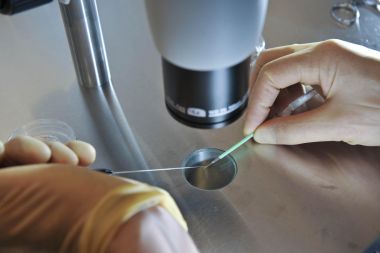Christian ethicists concerned over 'three parent baby' IVF plan

Christian ethicists have joined scientists in expressing concern about the latest Government steps towards creating what have been dubbed "three-parent babies". The Church of England is among those calling for more research.
The Government last week published its response to a 12-week Human Fertilisation and Embryology Authority (HFEA) consultation on draft regulations to permit the use of new techniques to prevent transmission of serious mitochondrial disease from mother to child.
Some oppose the proposed IVF technique, "mitochondrial replacement therapy", because they believe it is a form of genetic modification and creates children with, in effect, three parents. The Government response emphasises that no nuclear DNA, which provides physical and other traits that children inherit from their parents, would be contributed from the donated female egg or embryo. The Government has consistently rejected claims that the techniques constitute genetic modification.
Critics are protesting in particular against the Government's working definition in the document of genetic modification to mean the modification only of nuclear DNA in the chromosome meaning that mitochondrial donation techniques are not being counted as actual genetic modification.
It is estimated that one in 6,500 children are born each year with serious mitochondrial DNA disorder which can have a "devastating" effect on families, says the Department of Health document, including premature death of children, painful and debilitating suffering, long-term illness and low quality of life. The intention is to avoid this by allowing the use of eggs and embryos where the damaged mitochondrdia are repleaced by healthy mitochondria from a donor.
Dr Helen Watt, senior research fellow of the Anscombe Centre, a Roman Catholic medical ethics centre, told Christian Today: "The tone of the report is reassuring, but the proposals are extraordinarily reckless with the lives and health of future generations. To remove the entire nuclear material from one egg or embryo and place it in another partially-gutted egg or embryo is hardly a minor intervention. It is absurd to deny that this is germ-line genetic modification, just because the nuclear material is left untouched when 'harvested' from a donor egg or worse, a donor embryo. After all, on that definition cloning from an adult human being would not be 'genetic modification' either."
She added: "These techniques treat no-one, they merely manufacture children by means which are hazardous not just to those particular children but to generations to come. It is far better for couples who wish to avoid passing on a condition linked to mitochondrial genes to adopt a child than to seek new ways to be genetically related to a child lab-produced in this destructive and fragmentary way."
Christian Concern said the proposals could herald serious health, social and ethical dangers.
The campaign group warned they could lead to "lasting emotional damage" to children and submit them to serious, irreversible health risks, which would pass from generation to generation.
Andrea Williams, chiefr executive officer, said: "The HFEA itself has recommended that further research should be undertaken before proceeding with these proposals. The Government should have waited for the conclusion of these further tests before publishing the Draft Regulations."
In its response to the government consultation Christian Concern raised questions around further genetic modification of children to "enhance" traits such as intellect and appearance - in other words the creation of "designer babies".
Church of England in its response to the consultation engaged in close detail with the technical nature of the questions asked and was deliberately cautious, urging that both "safeguards" and "need" were clearly established. But the Church deliberately avoided a binary approach of being "for" or "against".
The Church called for children born from the process to have access to medical and personal information about donors. The Church said: "We believe that more research into the safety and efficacy of mitochondrial replacement therapy is necessary before regulations are introduced permitting the technique. It is estimated that only around 10 children per year might benefit from current techniques while 1 in 200 children are born with some form of mitochondrial disorder. Further research, resulting in assured safety and efficacy is likely to be more beneficial in the long-term than premature application of uncertain techniques. The introduction of regulations ought to await the results of such research."
Leading fertility expert, Lord Winston told The Independent: "The Government seems to have come to the right decision but used bizarre justification. Of course mitochondrial transfer is genetic modification and this modification is handed down the generations. It is totally wrong to compare it with a blood transfusion or a transplant and an honest statement might be more sensible and encourage public trust."











